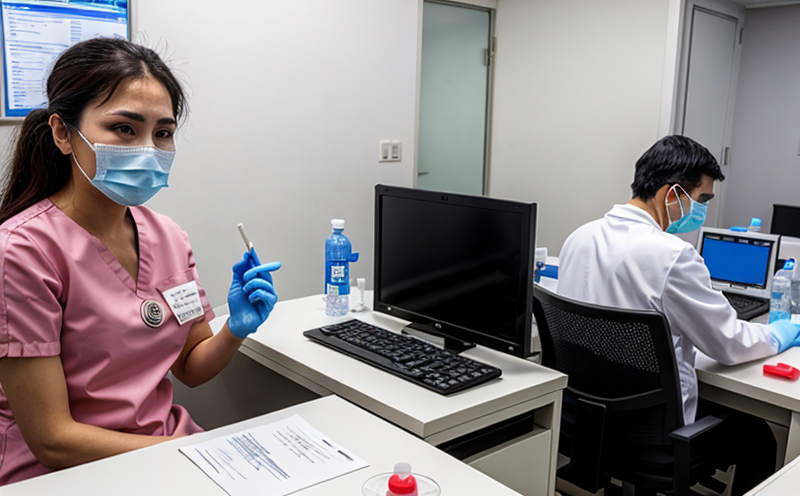Maedi-Visna Virus Serology Testing in Sheep
The Maedi-Visna virus (MVV) is a lentivirus that belongs to the genus Lentivirus and has been recognized as a significant pathogen causing chronic progressive pneumonia, encephalomyelitis, and other systemic diseases in sheep. This disease can severely impact livestock health and productivity, leading to substantial economic losses for farmers and producers.
The serological testing of MVV is crucial for early detection and management strategies aimed at controlling the spread of this virus within herds. This test primarily involves the measurement of antibodies against MVV using techniques such as Enzyme-Linked Immunosorbent Assay (ELISA) or Western Blot analysis.
ELISA assays are widely used due to their high sensitivity and specificity, making them an ideal choice for preliminary screening. They can detect even low levels of antibodies indicating infection, allowing for timely interventions such as culling infected animals or implementing biosecurity measures. The test also helps in monitoring the effectiveness of vaccination programs against MVV.
For accurate results, proper sample collection and handling are paramount. Blood samples should be taken from the jugular vein using sterile techniques to minimize contamination. Post-collection, samples must be processed promptly according to laboratory protocols to ensure integrity and avoid false negatives or positives.
The testing process involves several steps: first, the blood sera are prepared by centrifugation; secondly, these sera are subjected to ELISA plates pre-coated with specific MVV antigens. The presence of antibodies is then detected using secondary antibodies conjugated to enzymes which generate a visible signal upon reaction.
Interpreting results requires careful attention to quality control measures and adherence to internationally recognized standards such as ISO 15189 for laboratory accreditation. Positive tests indicate past or current exposure to MVV, while negative results suggest no detectable antibodies at the time of testing.
This serological approach is particularly useful in areas where MVV prevalence rates are high but not well-documented. It aids in identifying asymptomatic carriers who could otherwise contribute to disease transmission through breeding practices or sale events.
Regular surveillance using this method ensures that farmers and veterinarians can make informed decisions regarding herd management, which ultimately contributes to maintaining robust agricultural ecosystems resilient against zoonotic threats.
Applied Standards
- ISO 15189: Ensures the laboratory meets stringent quality and technical criteria necessary for accurate testing.
- ASTM E2554-03(2017): Provides guidelines on how to perform serological tests, including those targeting MVV.
- IEC 62793: Sets out requirements for medical laboratories dealing with infectious agents like MVV.
The use of these standards guarantees that our services adhere to the highest scientific and ethical practices, ensuring reliable and reproducible results.
Quality and Reliability Assurance
We maintain a robust quality management system compliant with ISO 15189. Our laboratories are equipped with state-of-the-art equipment calibrated according to international standards, ensuring precise measurements and accurate interpretations.
- Regular Calibration: All instruments undergo regular calibration checks to ensure they operate within specified tolerances.
- Standard Operating Procedures (SOPs): Comprehensive SOPs are followed meticulously, covering every aspect from sample preparation to final reporting.
- Training and Certification: Our staff receive continuous training in the latest techniques and technologies related to virology testing. They must also be certified by relevant bodies before handling samples.
Dedicated quality assurance teams oversee all processes, conducting internal audits regularly to identify potential issues early on. This proactive approach helps maintain high standards of service delivery across our network of laboratories.
International Acceptance and Recognition
The results obtained from our Maedi-Visna Virus Serology Testing are widely accepted internationally due to their strict adherence to global standards. Many countries rely on these tests when conducting official inspections or issuing export certificates for livestock products.
Laboratories accredited under ISO 15189 are recognized by the World Organisation for Animal Health (OIE), ensuring that our findings hold significant weight in international trade negotiations and regulatory frameworks.
Our services have been utilized by numerous organizations including government agencies, private enterprises involved in livestock production and research institutions focused on veterinary medicine. By partnering with us, clients gain access to reliable data supporting evidence-based decision-making processes crucial for maintaining global animal health standards.





